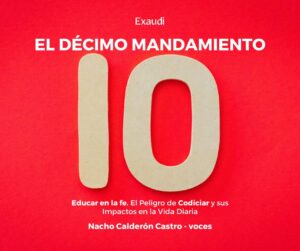The Tenth Commandment
Educate in faith. The Danger of Coveting and Its Impacts on Daily Life

Nacho Calderón Castro gives Exaudi readers in the Educate in Faith series, a series of articles dedicated to the 10 commandments.
***
The last of the commandments appears in Exodus, 20, 17, it is “You shall not covet your neighbor’s house, nor his wife, nor his servant, nor his ox, nor his donkey, nor anything that belongs to him.”
It is one of the commandments that most clearly shows the protective hand of God over his children.
We already announced in last week’s introduction that the Decalogue is made to facilitate the children of God to lead the Fullest life possible, but it is not always as easy to appreciate as in this last precept.
Coveting – desiring – other people’s property is torture. My very wise mother said that “envy is the only sin that those who commit it suffer from.”
Indeed, if we sin lust or gluttony, we will have acted badly, but at least we have enjoyed it – hence how easy it is to fall into thinking of the simplicity “into thinking that nobody can’t take away the good times I had” – but coveting other people’s goods only serves to create bad blood.
Coveting is more than a simple “I would like to have”, it is a serious desire for it to be mine and, on many occasions, for it to stop being yours.
We see it frequently in children. If we give two children from 2 to 4 years old a toy, we wouldn’t be surprised if each one cries because he doesn’t like the one we gave him and wants his brother’s, ah! But if we change their toys, then they still don’t like it be happy, now they say they want the first toy we had given them.
What they really want is to have both and, above all, for their brother to have neither!
It is a childish thought, but make no mistake, it is exactly the same one that envious adults have, those who covet other people’s goods. No wonder it causes so much suffering!
Hence, the importance of teaching our children the real value of goods: their usefulness. The useless could be attractive, but never enough to be coveted.
It’s not about telling them: “if it’s just a toy, look at all the ones you have.” By saying “look at all the ones you have”, we continue to give importance to the objects.
Say that to a collector of stamps, cars or stones, “look at all the ones you have”. Does not matter. It’s not about what I have, but what I DON’T have.
I want it all!, especially if he (or she) has it.
The person who suffers from greed, envy or avarice is insatiable. He is never satisfied (to the joy of Apple owners, for example).
And naturally in the statement of the precept there is an explicit reference to “you shall not covet his wife.” Let’s be clear, the author of the commandments knows our nature as if he had given birth to us, how could he not make a direct mention of lusting after the neighbor’s wife!
Well, of course, knowing us, he knew that he had to warn us and protect us from the rejection of our spouse to replace him with a new “sentimental relationship” (I am sure that the term “sentimental” was initially used ironically, but today it has been extended to common use).
Why is it a sin to covet what is not ours? It is very simple, because it harms us, and anything we do voluntarily that harms ourselves or others offends God.
As childish, as greed, is the desire to provoke it. There are people who like to provoke envy. In reality, this sin is called scandal: “Action or word that causes someone to act badly or think badly of another person.”
The poor people who go around wanting to be envied are just that: poor things. The bad thing is that they always find someone as poor as them willing to envy them.
That greed, the desire for other people’s things, unbridled desire is a very sad sin, we all know it. Avoiding it helps us live more fully, which is why it is in the Decalogue.
There are those who believe that it is enough to “not take” what does not belong to us, that if we do not “act”, then there is no harm. God who knows us best knows that thought poisons us. There are people who never do a bad action, but inside they are filled with envy, greed, and if it did not appear among the 10 commandments they would not fight against that poison.
If you put the quote from Exodus 20, 17 on your Facebook wall you won’t get many likes – especially if you put the author and the source – but try putting some of the following quotes, and you will see the viral effect you get:
Do you want to be rich? So do not strive to increase your wealth, but rather to decrease your greed. Epicurus of Samos (341 BC-270 BC) Greek philosopher.
Do not value money more or less than it is worth, because it is a good servant and a bad master. Alexandre Dumas (son) (1824-1895) French writer.
Poverty does not come from the decrease in wealth, but from the multiplication of desires. Plato (427 BC-347 BC) Greek philosopher.
He who does not consider what he has as the greatest wealth, he is unhappy, even though he is master of the world. Epicurus of Samos (341 BC-270 BC) Greek philosopher.
He who has little is not poor, but he who desires much. Seneca (2 AC-65) Latin philosopher.
The money you have is an instrument of freedom, the money you seek is an instrument of servitude. Jean-Jacques Rousseau (1712-1778) French philosopher.
My happiness consists in the fact that I know how to appreciate what I have and do not excessively desire what I do not have. Leo Tolstoy (1828-1910) Russian writer.
The origin of all evil is greed. André Maurois (1885-1967) French novelist and essayist.
Because of our greed, much is little; Because of our need, little is much. Francisco de Quevedo (1580-1645) Spanish writer.
There is no man who, if he can earn the maximum, will settle for the minimum. Friedrich Schiller (1759-1805) German poet and playwright.
The phrases are nice, all after the Decalogue was written, but they are all missing something. They lack the why.

THE TENTH COMMANDMENT
Educate in faith. The Danger of Coveting and Its
Impacts on Daily Life
Nacho Calderón Castro – vocals
Related

Pope Francis spent a peaceful night
Exaudi Staff
02 March, 2025
1 min

Pope Francis has had a peaceful night
Exaudi Staff
25 February, 2025
1 min

What should the boyfriend or girlfriend I should find be like?
Patricia Jiménez Ramírez
24 February, 2025
4 min

The Pope spent a quiet night at Gemelli
Exaudi Staff
23 February, 2025
1 min
 (EN)
(EN)
 (ES)
(ES)
 (IT)
(IT)

